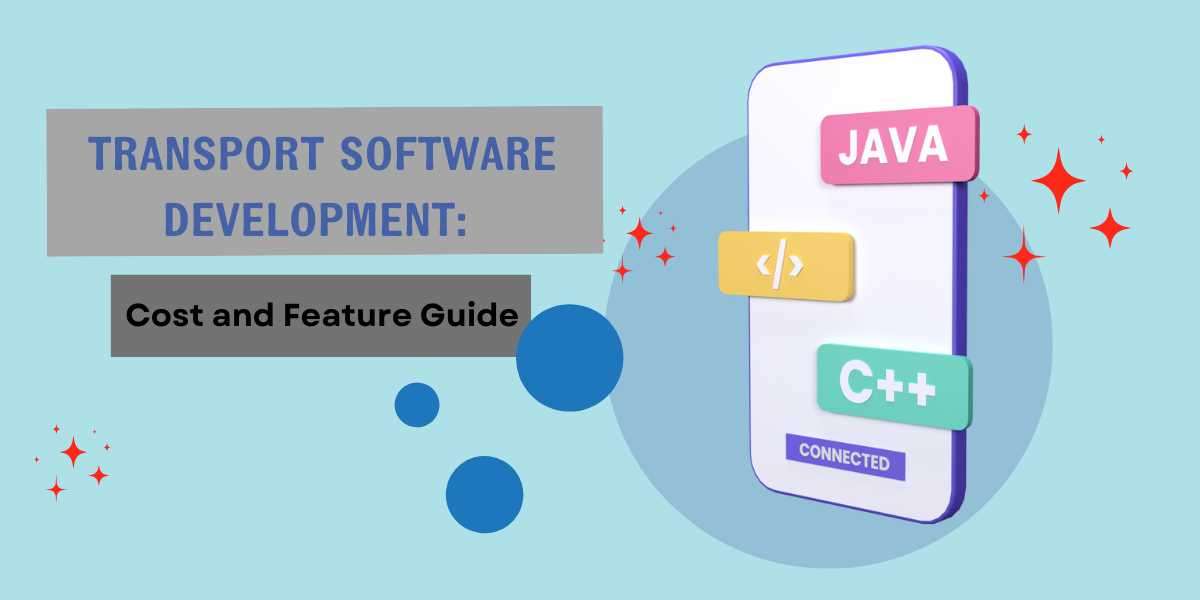Transport software development has become a necessity in the modern transportation industry. With the rising demand for efficiency, automation, and real-time tracking, businesses are investing in advanced transport software solutions. Whether it's for logistics, fleet management, public transportation, or ride-sharing services, transport software enhances operational capabilities, reduces costs, and improves user experiences.
This guide covers the essential aspects of transport software development, including its features, benefits, cost estimation, and key considerations to ensure successful implementation.
What is Transport Software Development?
Transport software development refers to the creation of digital solutions that streamline and optimize transportation-related activities. These solutions include logistics software, fleet management systems, public transport apps, route optimization tools, and ride-sharing applications.
The software is designed to facilitate real-time tracking, automate dispatching, enhance driver management, and improve customer experiences. Transport businesses leverage software solutions to increase efficiency, reduce operational costs, and enhance decision-making through data analytics.
Key Features of Transport Software
1. Real-time Tracking GPS Navigation
One of the most important features in transport software is real-time GPS tracking, which allows businesses and customers to monitor vehicle locations, estimated arrival times, and optimize routes.
2. Route Optimization
AI-powered route optimization helps drivers choose the most efficient paths, reducing fuel costs and delivery times. This feature is essential for logistics, ride-sharing, and delivery businesses.
3. Fleet Management
Transport software includes features to manage fleets, such as maintenance scheduling, driver monitoring, fuel tracking, and performance analytics.
4. Automated Dispatching
Automated dispatching assigns drivers and vehicles based on demand, location, and availability. This feature enhances operational efficiency in ride-sharing and logistics businesses.
5. Booking and Scheduling
Customers can schedule rides, deliveries, or transport services through an easy-to-use interface. Advanced scheduling helps optimize vehicle allocation and reduce downtime.
6. Payment Integration
Seamless payment processing via credit cards, digital wallets, and online banking is crucial for transport businesses. Secure payment gateways ensure hassle-free transactions for users.
7. Multi-platform Accessibility
Transport software should be accessible via mobile apps, web portals, and even APIs for third-party integrations, ensuring seamless operations across devices.
8. Analytics and Reporting
Advanced analytics and reporting tools help businesses track performance metrics, monitor revenue, and improve operational efficiency using data-driven insights.
9. Customer Support Chatbots
Providing real-time customer support through chatbots or live agents enhances user experience and ensures problem resolution for riders or logistics clients.
10. Regulatory Compliance Security
Compliance with government transportation regulations and data security protocols is essential for maintaining legal and ethical business operations.
Benefits of Transport Software Development
1. Increased Efficiency
Automating transport operations reduces human errors and improves accuracy in scheduling, dispatching, and fleet tracking.
2. Cost Reduction
Optimized routes, automated processes, and better fuel management contribute to significant cost savings for businesses.
3. Enhanced Customer Experience
Customers benefit from real-time updates, seamless booking, and secure payments, leading to higher satisfaction and loyalty.
4. Improved Safety and Compliance
Transport software helps businesses comply with industry regulations, track driver behavior, and ensure vehicle maintenance, reducing safety risks.
5. Scalability and Growth
Businesses can scale their operations efficiently with transport software that adapts to increasing demand and technological advancements.
Cost of Transport Software Development
Factors Affecting the Cost
The cost of developing transport software varies depending on several factors:
1. Software Complexity
The complexity of the software significantly impacts its cost. Basic applications with limited features are more affordable, while AI-powered or enterprise-grade solutions require higher investments due to advanced functionalities and integration needs.
2. Feature Set
The number and type of features included in the software affect development costs. Essential features like tracking, booking, and payments are standard, while advanced features such as AI-powered route optimization, predictive analytics, and automated dispatching increase costs.
3. Development Team
Hiring an in-house development team, outsourcing to a software company, or working with freelancers influences the budget. Offshore development can be cost-effective, while premium agencies charge higher rates for quality and expertise.
4. Technology Stack
The choice of programming languages, frameworks, and cloud services affects development costs. Using cutting-edge technologies or integrating third-party APIs (such as Google Maps, Stripe, or Twilio) may increase expenses but enhance functionality.
5. Customization Integrations
Businesses often require custom solutions tailored to their needs. The more customized the software, the higher the cost. Integrating with existing systems like ERP, CRM, or IoT devices also adds to the development expenses.
6. Security Compliance
Ensuring robust security measures, data encryption, and regulatory compliance (GDPR, HIPAA, or industry-specific regulations) requires additional development effort and cost but is crucial for protecting user data and avoiding legal issues.
Estimated Cost Breakdown
- Basic Transport App: $20,000 – $50,000
- Mid-level Fleet Management Software: $50,000 – $100,000
- Advanced AI-based Logistics Software: $100,000 – $500,000+
Costs also vary based on location; development in the U.S. or Europe is more expensive than in Asia or Eastern Europe.
Steps to Develop Transport Software
1. Requirement Analysis
This step involves understanding business needs, defining project goals, and setting the scope of the software. It ensures that the final product aligns with operational requirements and customer expectations.
2. Planning Wireframing
A structured blueprint of the software is created, including wireframes and design mockups. This phase helps visualize the user interface, functionalities, and navigation flow before development begins.
3. Technology Selection
Choosing the right programming languages, frameworks, and cloud solutions is crucial for the software’s performance, scalability, and security. The selection should align with business goals and technical requirements.
4. Development Testing
Developers write code, integrate APIs, and build core functionalities. Throughout this phase, rigorous testing is conducted to identify bugs, ensure smooth performance, and optimize user experience.
5. Deployment Maintenance
After successful testing, the software is deployed for use. Regular updates, technical support, and feature enhancements are essential to keep the software relevant and efficient.
Choosing the Right Development Partner
Selecting a reliable software development company is crucial. Look for:
- Experience in transport software solutions.
- Strong portfolio and client reviews.
- Ability to integrate modern technologies like AI and IoT.
- Transparent pricing and development timeline.
Conclusion
Transport software development is a game-changer for businesses in logistics, ride-sharing, and fleet management. Investing in the right features, choosing the right development partner, and planning a scalable solution can help businesses improve efficiency and reduce operational costs. If you want to get software development services, just get in touch with Best Transportation software development services provider company.
By understanding the development process, cost factors, and essential features, businesses can make informed decisions to build transport software that meets their unique needs and drives success.








